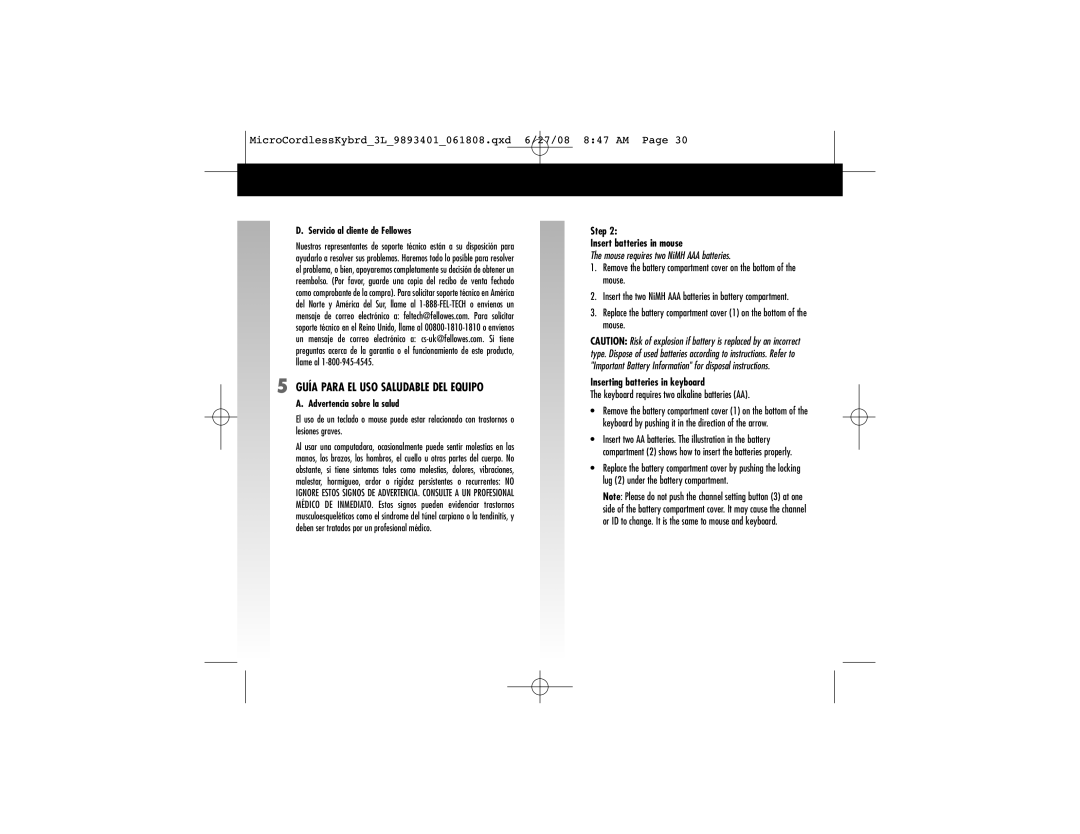
MicroCordlessKybrd_3L_9893401_061808.qxd 6/27/08 8:47 AM Page 30
D. Servicio al cliente de Fellowes
Nuestros representantes de soporte técnico están a su disposición para ayudarlo a resolver sus problemas. Haremos todo lo posible para resolver el problema, o bien, apoyaremos completamente su decisión de obtener un reembolso. (Por favor, guarde una copia del recibo de venta fechado como comprobante de la compra). Para solicitar soporte técnico en América del Norte y América del Sur, llame al
5 GUÍA PARA EL USO SALUDABLE DEL EQUIPO
A. Advertencia sobre la salud
El uso de un teclado o mouse puede estar relacionado con trastornos o lesiones graves.
Al usar una computadora, ocasionalmente puede sentir molestias en las manos, los brazos, los hombros, el cuello u otras partes del cuerpo. No obstante, si tiene síntomas tales como molestias, dolores, vibraciones, malestar, hormigueo, ardor o rigidez persistentes o recurrentes: NO IGNORE ESTOS SIGNOS DE ADVERTENCIA. CONSULTE A UN PROFESIONAL MÉDICO DE INMEDIATO. Estos signos pueden evidenciar trastornos musculoesqueléticos como el síndrome del túnel carpiano o la tendinitis, y deben ser tratados por un profesional médico.
Step 2:
Insert batteries in mouse
The mouse requires two NiMH AAA batteries.
1.Remove the battery compartment cover on the bottom of the mouse.
2.Insert the two NiMH AAA batteries in battery compartment.
3.Replace the battery compartment cover (1) on the bottom of the mouse.
CAUTION: Risk of explosion if battery is replaced by an incorrect type. Dispose of used batteries according to instructions. Refer to "Important Battery Information" for disposal instructions.
Inserting batteries in keyboard
The keyboard requires two alkaline batteries (AA).
•Remove the battery compartment cover (1) on the bottom of the keyboard by pushing it in the direction of the arrow.
•Insert two AA batteries. The illustration in the battery compartment (2) shows how to insert the batteries properly.
•Replace the battery compartment cover by pushing the locking lug (2) under the battery compartment.
Note: Please do not push the channel setting button (3) at one side of the battery compartment cover. It may cause the channel or ID to change. It is the same to mouse and keyboard.
